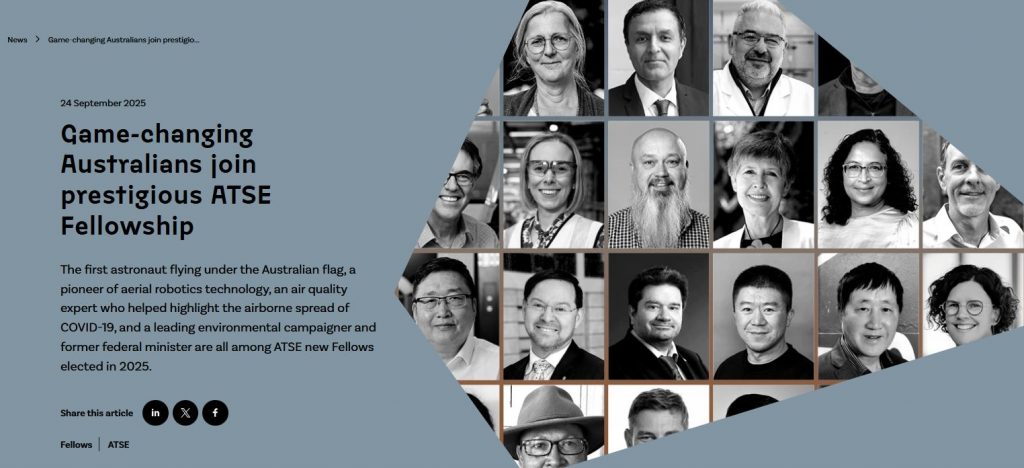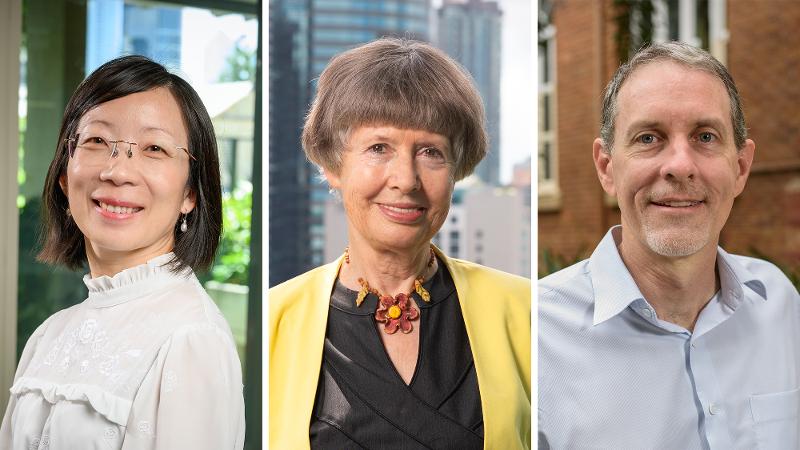
They join a group of 35 leading innovators who have been elected this year to join the prestigious group, following outstanding achievement in the fields of applied science and engineering.
ATSE President Dr Katherine Woodthorpe said that 2025’s new Fellows represented the breadth and depth of world-class Australian innovation.
“Our expert Fellows are world leaders – and are working on the game-changing tech and innovations that are helping to solve the most pressing and complex challenges,” Dr Woodthorpe said.
Distinguished Professor Lidia Morawska
Air pollution paradigm-shifter
“This recognition reflects the importance of science in protecting human health and the environment. I am honoured to contribute to global efforts that make our air cleaner and our spaces safer.”
A global authority on airborne particles, Distinguished Professor Lidia Morawska, from the School of Earth and Atmospheric Sciences, has redefined the application of air pollution science and translated it into real-world evidence and advice for governments and intergovernmental bodies.
During the COVID-19 pandemic, her evidence-based advocacy on airborne transmission transformed public health authorities’ understanding and management of respiratory infections, influencing international health guidelines and saving countless lives.
Her research on ultrafine particles has informed the World Health Organisation’s Global Air Quality Guidelines, building design standards and ventilation practices worldwide.
Professor Morawska is Director of the ARC Training Centre for Advanced Building Systems Against Airborne Infection Transmission (THRIVE) and was named one of Time Magazine’s 100 most influential people in 2021.
One of Australia’s leading scientists, she has reinforced Australia’s high standing in the global STEM community and inspired the next generation of innovators, researchers and students.
Her extraordinary dedication has connected fundamental science to real-world policy and practice to provide clean air for all.
Professor Ian O’Hara
Australia’s biofuture shaper
“Passionate about biotechnology to drive sustainable energy solutions, I am proud to elevate Australia’s global bioeconomy presence through industry, policy and academic leadership.”
Professor Ian O’Hara is a globally recognised leader in the bioeconomy, driving advancements in sustainable aviation fuels and biomanufacturing to support regional economic development.
His expertise and advocacy for aligning research, industry and government efforts have enabled the industrial translation of bio-based innovations, and informed impactful policy at both state and national levels.
As Queensland’s inaugural Biofutures Industry Envoy, he has facilitated international partnerships, attracted significant investment and shaped policy frameworks, including the Queensland Government Biofutures Roadmap.
In his role as Deputy Dean of the Faculty of Engineering, Professor O’Hara champions the industrial translation of research through scale-up engineering and has delivered critical translational infrastructure, such as the QUT Pioneer Biopilot – Australia’s premier open-access facility for advancing industrial biomanufacturing and precision fermentation.
A recipient of the Engineers Australia 2024 Chemical Engineer Achievement Award, his contributions have directly impacted regional economic development, workforce skills advancement and supply chain decarbonisation.
Professor Hongxia Wang
Solar innovator
“Renewable energy is key to a sustainable future and our research is helping Australia lead in solar innovation and clean energy solutions.”
Professor Hongxia Wang, from the School of Chemistry and Physics, is a globally recognised scholar in advanced materials and manufacturing processes for emerging solar cell technologies, with a focus on translating technological innovations into practical applications.
She has dedicated her career to transforming material and technological advancements into commercial successes.
Her patented carbon electrode technology for efficient and stable perovskite solar cells has underpinned the sovereign manufacturing of this emerging PV technology by Australian start-up Halocell, strengthening Australia’s renewable energy capabilities.
She also discovered a novel iodide ion-conducting material tailored for dye-sensitized solar cells, which led to the creation of a commercial product marketed by an Australian company.
As a pioneer in the field, Professor Wang has developed sustainable, environmentally friendly fabrication processes for solar cells.
Her work bridges academic innovation with industry application, contributing to global efforts in clean energy solutions and positioning Australia as a leader in low-emission technologies.
As ARC Laureate Fellow and Australian Georgina Sweet Laureate Fellow, she also plays a key role in building national research capacity and mentoring the next generation of scientists.

The 2025 ATSE Fellows will be formally inducted at the Academy’s annual event later this year.
They join other QUT researchers previously named as ATSE Fellows including Distinguished Professor James Dale, Professor Ana Deletic, Professor Clinton Fookes, Professor Dennis Gibson, Professor Bronwyn Harch, Dr Cherrell Hirst and Professor Michael Milford.

Main photo (left to right): Professor Hongxia Wang, Distinguished Professor Lidia Morawska, Professor Ian O’Hara
Media contact:
Lauren Baxter
QUT Media
media@qut.edu.au
07 3138 2361 / 0407 585 901 (After Hours)
Content for this post taken from QUT Media: https://www.qut.edu.au/news?id=201751